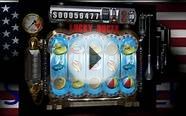
Play slots online for real Cash
Some slots prizes are so big they can change your standard of living. American slots players haven’t always been able to find good real money casinos online to enjoy their favorite type of bets, though. This page explains why that is, why things are changing at the present, and where US players can find real money online slots in 2014 and beyond.
UIGEA Pushed out Old Slot Casinos
In September of 2006, the U.S. Congress voted into the existence of the Unlawful Internet Gambling Enforcement Act. Politicians actually used an underhanded tactic to tack the bill onto the Safe Port Act, because such a comprehensive anti-gambling law could never have been passed on its own merits–it had to be combined with a law that almost no politician would have voted against in a mid-term election year.
The UIGEA greatly expanded the federal agencies’ ability to prosecute gambling operators, because it expanded the definition of the 1961 Wire Act to include most bet-related money transactions used in online gambling. Most of the big online casinos, such as Ladbrokes, William Hill, and Paddy Poker left the American industry within months. The big UK and European casino software design companies, such as Playtech, Microgaming, Cryptologic, Net Ent, and IGT, also left the American online betting industry. Almost overnight, the world’s largest gambling community found itself desperate for online gambling.
No form of gambling was more affected than real money online slots. Real money gambling for the one-armed bandits dried up in a matter of months. U.S. players who funded accounts on sites like William Hill, Ladbrokes, Bovada (Bodog), or 888 Casino suddenly found they could no longer play for real cash. They had to withdraw their money and find a new game.
Playing Real Money Slots
2007 to 2013 proved to be lean years for American slots gamblers who wanted to find legitimate real money slot machine operations online. Realtime Gaming had its network of sites, including the successful Bodog/Bovada brand of game. Meanwhile, Rival Gaming and Topgame Technology built smaller networks, while groups like the Cake Network continued to operate. These various companies were often based in the Caribbean, and not all of them had good reputations (though some did). US players could find a game, but the experience wasn’t always as positive as it was when they were playing at casinos whose parent companies were listed on the London Stock Exchange.
State Licensed Online Casinos
In late 2011, the U.S. Department of Justice announced it was changing its stance on its interpretation of the Wire Act. The new interpretation states the federal authorities have the right to prosecute violations of the Wire Act as it pertains to sports betting, but no other forms of gambling. This opened the door for state governments to license, regulate, and tax casino gaming and poker betting.
You might also like












